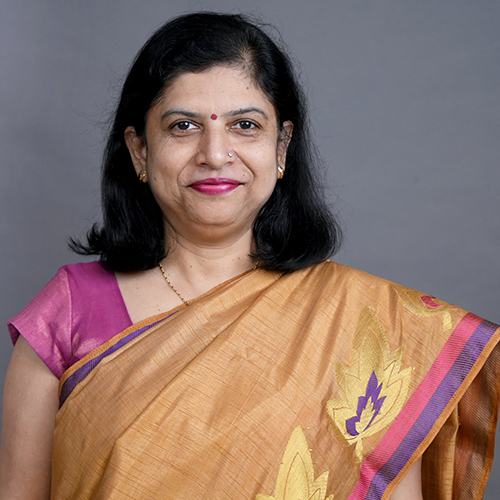FPT Conference on Business, Economics and Management (FCBEM 2025) is an academic platform in which professors, researchers, industry experts and practitioners could gather and exchange their insights on business, economics and management and other relevant matters as well as the construction of their publications. The Conference welcomes contributions and submissions of those who have interest in the fields of business, economics and management and the related fields. This year, we are proud to have the presence of two distinguished keynote speakers with solid background and wide experience of these majors.

As a Director Faculty and Staff Development Centre, Somaiya Vidyavhiar University and Professor at K J Somaiya Institute of Management, Somaiya Vidyavihar University
https://www.linkedin.com/in/dr preeti-s-rawat-27332155
https://vidwan.inflibnet.ac.in/profile/454604
Prof. Preeti S. Rawat holds the dual portfolio of Director Faculty and Staff Development Centre, Somaiya Vidyavhiar University and Professor at K J Somaiya Institute of Management, Somaiya Vidyavihar University. She is also the Editor of the Institute’s Management journal Business Perspectives and Research (BPR) published by Sage Publications. The journal is Scopus indexed (Q2) and is listed in ABS, ABDC and UGC Care list.
In her long career-span stretching more than 25 years, Prof Preeti Rawat has been an institution builder, contributing successfully be chairing positions like the Area Chairperson of OB/HR at KJ Somaiya Institute of Management, Chairperson of Centre for Diversity Management and Inclusion (CDMI), Director HR of Somaiya Group of Institutions and University and Independent Director of Godavari Biorefineries Limited. As a Professor in OB/HR Prof. Preeti has taught many courses across programs like PGDM, MBA, Programs for Working Executives, MBA-Health Care and also designed papers like Diversity and Inclusion. Over the years she has organized many international conferences for the Institute including the Euromed Conference in 2020.
Prof Preeti has earned her doctorate in the area of empowerment and leadership from University of Mumbai, India. Her research interests are leadership, motivation and attitudes (empowerment, organizational commitment, job satisfaction, presenteeism), gender and persons with disability and inclusion. Preeti has participated in multiple International Conferences in Europe, Asia and Africa. She has published her research work in journals like International Journal of Productivity and Performance Management (Scopus Q1, ABDC-B,Emerald), Equality, Diversity and Inclusion(Scopus Q1, ABDC-B,Emerald), South Asian Journal of Business Studies((Scopus Q1, ABDC-C,Emerald), Journal of Indian Business Research (Scopus Q2, ABDC-C,Emerald), International Journal of Educational Management (Scopus Q2, ABDC-B), Vikalpa (Scopus Q3, ABDC-C), Indian Journal of Industrial Relations (ABDC-C). Prof Preeti Rawat has published a book on ‘Workplace Empowerment’ with Excel Publishers. She has also authored a few cases published under The Case Centre.
Prof Preeti is a certified Behavioral and Executive Coach, assessor for WorkPlace Big Five Profile 3.0TM and Seville International Certification. She has also successfully completed the basic course offered by Indian Society for Applied Behavioral Science (ISABS).
Her Management training experience spans across private and public sector organizations in the areas of Diversity and Inclusion (gender, disability, millennial), leadership, employee engagement, empowerment, handling difficult feedback, psychometric testing, interpersonal effectiveness, positive attitude, motivation, managing trust at workplace, transactional analysis, understanding self, time management, problem solving skills for technical persons, overcoming personal ineffectiveness, effective management of colleagues and subordinates, team building and management of change, Inspirational Leadership, developing a growth mind-set. She was also a part of the team involved in the successful organizational restructuring of a SME in Maharashtra and manpower optimization exercise of a 550 bed hospital in Mumbai.
Some of the client organizations where Prof Preeti has conducted training are Reliance Industries Limited, Power Grid, Technova Inc., Shipping Corporation of India, Bhabha Atomic Research Centre, Department of Atomic Energy, INS Hamla, Reliance Energy Limited, MERC, Insurance Institute of India, Sun-Pharma, Sandoz and Sujan – Cooper Standard, PHI, Godavari Biorefineries Limited, Arkema, LIC, HDFC Securities, and Galderma, Godrej and Boyce.
Prof. Preeti is the recipient of several awards for best paper in conferences globally and has been recognized as the best faculty in OB/HR by many felicitating organizations.
Abstract
Organisations globally are undergoing technological changes, geoeconomic fragmentations, economic uncertainty, demographic shifts and the green transition. These changes individually and in combination are among the major drivers expected to shape organisations by 2030 (The Future of Jobs Report, WEF 2025). Demographic changes (ageing and declining working age populations, predominantly in higher-income economies and expanding working age populations, predominantly in lower-income economies (The Future of Jobs Report, WEF 2025), demand for new skills and junking of diversity and inclusion initiatives have created new challenges for the organisations.
Coupled with this, the intense competition to win customers has challenged the efficacy of hierarchical organisations, giving way to the rise of fractal organisation structures. According to BCG report, (2022) until recently, companies could successfully compete for global customers, products, and brands by focusing on scale and efficiency under the direction of a powerful central leadership. But the new age winners are those companies with teams on the ground that are laser-focused on winning local customers, micro-markets, and fast-developing profit pools. Scaling the core - a formula developed for a stable, integrated, globalised economy that is rapidly fragmenting—has given way to innovation, speed, and responsiveness at the edge. With the dwindling of the hierarchical structures, the age-old perception of hierarchical leadership models is giving way to shared leadership, an emergent team phenomenon whereby leadership roles and influence are distributed among team members.
In this scenario, collaboration skills at individual, group, and organisational levels are the need of the hour. Derived from the Latin, collaborate--meaning colour together, and labour is to work--the Oxford English Dictionary defines collaboration as ‘united labour’, ‘co-operation’.
At the individual level, collaboration is the skill of being inclusive in actions. Collaboration at an interpersonal level is a process in which autonomous or semi-autonomous actors interact through formal and informal negotiation, jointly creating rules and structures governing their relationships and ways to act or decide on the issues that brought them together; it is a process involving shared norms and mutual interactions. At an institutional level, collaboration is an evolving process whereby two or more social entities actively and reciprocally engage in joint activities to achieve at least one shared goal.
The discourse will unravel the construct of collaboration, the role of culture in institutionalising collaboration, and shared leadership as a collaborative force driving fractal organisations.

The University of Melbourne
Professor Russell G. Thompson leads the Physical Internet Lab at the University of Melbourne and is Vice-President of the Institute for City Logistics based in Kyoto
Professor Russell G. Thompson leads the Physical Internet Lab at the University of Melbourne and is Vice-President of the Institute for City Logistics based in Kyoto. Russell was a leader of the Volvo Global Center of Excellence in Sustainable Urban Freight Systems, 2013-2020. He has published over 15 books and 250 refereed publications in the field of freight and logistics. Russell is a co-author of the recent book, Urban Freight Analytics: Big Data, Models and Artificial Intelligence. Currently, Russell is actively involved in conducting research studies investigating the benefits of the Physical Internet (PI), including initiatives such as parcel lockers, crowdshipping, collaborative freight systems and multi-modal freight systems.
This presentation will introduce key concepts of the Physical Internet (PI) and how they can be adopted to improve the connectivity, sustainability and resilience of logistics networks. A description of how intermodal terminals, land-bridging and synchromodality can enhance global logistics networks will be presented. Several City Logistics initiatives, including parcel lockers, crowdshipping, micro-consolidation centres, high performance freight vehicles and digital platforms will also be described.